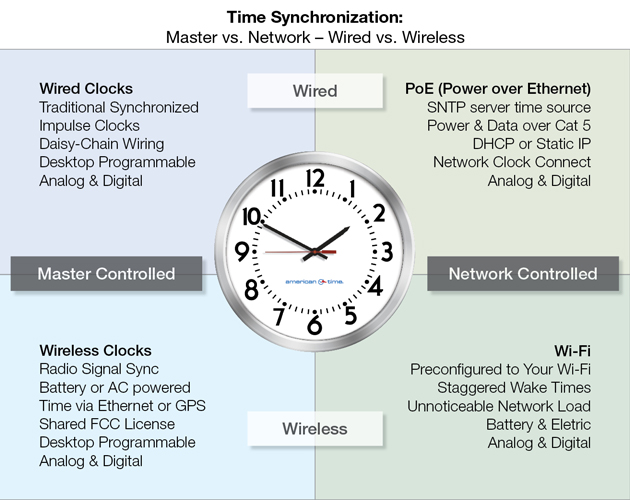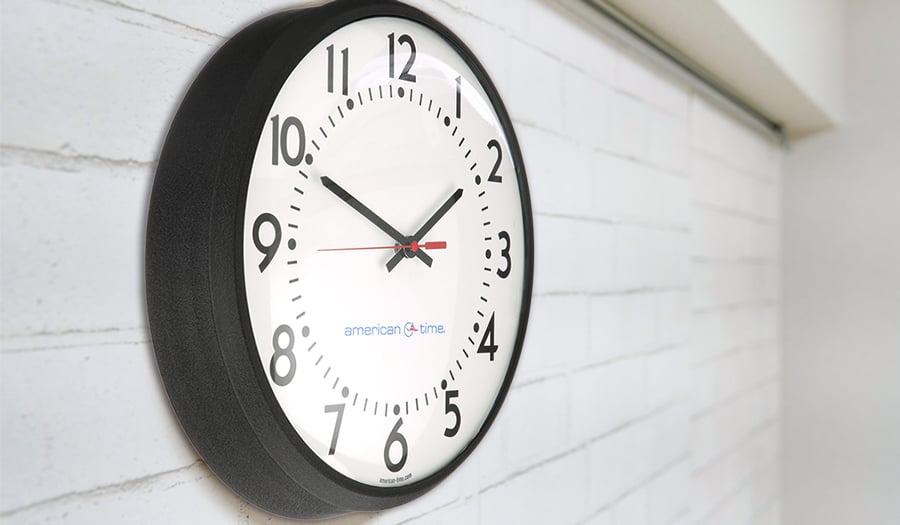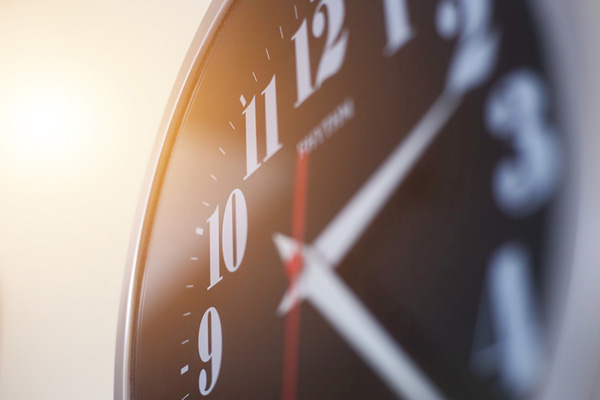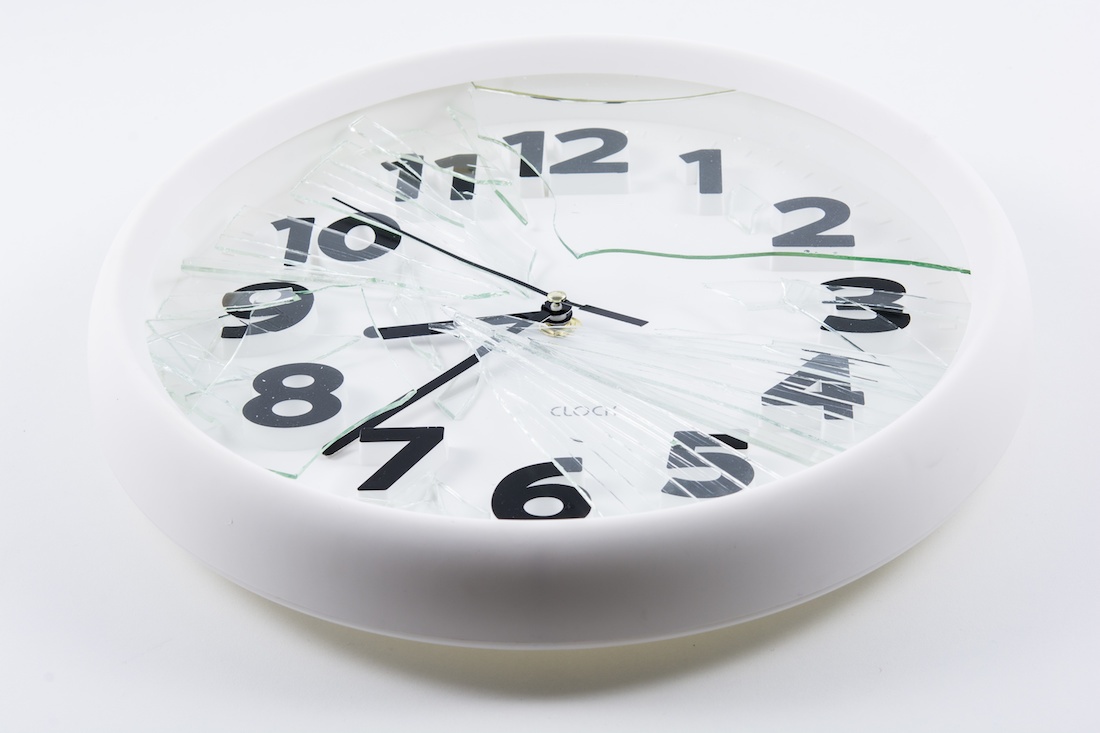Years ago, wired clock systems were the standard, reliable method to keep synchronized time in schools and businesses. Today, those clocks are still manufactured, but there are also wireless options, which utilize more modern technology to transform timekeeping.
So, which solution is best for your school or facilities?
Read More
Topics:
Synchronized Clock Systems,
Wired Clock Systems,
Wireless Clock Systems,
Master Clocks,
System Controllers
A student races to class as the hallway countdown timer nears zero and the bell rings. An employee meeting starts promptly because everyone is on time. Shift changes are in sync and disruptions are minimized.
Things that seem insignificant to the casual observer – like clocks, bells, and buzzers – have an outsized impact on the productivity of a building or campus. Maintenance teams, building managers, IT directors, teachers and leaders know this.
A single, go-to resource for clocks, bells, buzzers, parts, repairs and upgrades – “standardizing” your clock and bell systems – is an important way to improve the efficiency and cost-effectiveness of your operations.
Let’s look at the key considerations and factors to think about in order to standardize your systems…
Read More
Topics:
School Clock Systems,
Synchronized Clock Systems,
Wireless Clock Systems,
Timekeeping,
Master Clocks,
System Controllers
High-quality clocks that stay in precise synchronization must have access to two important sources to operate successfully: A power source and a time source.
However, terms like “wireless clocks” and “wired clocks” are commonly used but often misunderstood. In this article, you’ll learn more about these terms and what they mean for synchronized clocks in your building.
Read More
Topics:
Synchronized Clock Systems,
Wired Clock Systems,
Wi-Fi Clock Systems,
Wireless Clock Systems,
PoE Clock Systems
Is your internet router in a place that can be bumped by people in the office? Do you see students jump up to slap that exit sign above the door?
Guards for clocks and other pieces of vital equipment protect your investment from damage, vandalism, and theft. After all, it's not just the equipment you have to think about, but the environment that surrounds it.
- In schools, clocks, exit signs and other assets are magnets for students goofing around or the errant gym ball.
- On shop floors, debris, sprays and dust can coat your equipment and impact their ability to operate. Lots of moving people and equipment can also easily damage an asset.
- Theft or accidental damage is possible in any building. Guards keep your assets protected, clean, and optimized.
There are even more environments where protective guards can save time, money and headaches. Here’s a look at the types of equipment guards available, why they're important, and the best environments for them.
Read More
Topics:
Clock Maintenance and Repairs,
Protective Wire Guards,
School Clock Systems,
Synchronized Clock Systems,
Wi-Fi Clock Systems,
PoE Clock Systems,
Digital Clocks,
Master Clocks
Accurate, synchronized clocks in your building, school or facility are more than a convenience. When clocks display the wrong time or different times from each other, major disruptions and even risks can happen, such as….
- Meetings, classes or shifts start and end at different times, causing confusion and inefficiency
- Wages or compensation are disputed
- Critical tasks like surgeries, food prep or manufacturing processes aren’t tracked or reported accurately
- Maintenance staff spend too much time on clock repairs and adjustments
| “Employees didn’t have reliable clocks for calculating shift changes or break times. There were lots of debates about whether an employee was really tardy or not, whether some people were abusing their break times by leaving early and returning late, and whether meetings were starting and ending on time.” DMR Electronics |
Read More
Topics:
Daylight Saving Time,
School Clock Systems,
Synchronized Clock Systems,
Wired Clock Systems,
Hybrid Clock Systems,
Wireless Clock Systems,
PoE Clock Systems,
EverAlert,
Digital Clocks,
Master Clocks
If you're tasked with selecting a clock system for your organization, the idea might be easy at first: You just buy some clocks and hang them on the walls, right?
But synchronized clock technology offer many options, and the best decision for you depends on the needs of your organization. Here, we'll help determine which type of clock is best for you depending on your industry and the type of building you're responsible for keeping on time.
Read More
Topics:
School Clock Systems,
Synchronized Clock Systems,
Wired Clock Systems,
News,
Clocks for Healthcare,
Higher Education,
Wi-Fi Clock Systems,
Wireless Clock Systems,
PoE Clock Systems,
Architecture,
manufacturing,
Healthcare Facilities,
Facility Management
Daylight saving time (DST) changes were formally established in most of the United States almost 60 years ago, but the biannual changes continue to be a hassle for maintenance teams, facility managers, IT staff and anyone else in charge of keeping a building running smoothly.
Here are some tips for preparing your clocks for DST and troubleshooting if things don’t go as planned.
Read More
Topics:
Daylight Saving Time,
Synchronized Clock Systems,
Wired Clock Systems,
Wireless Clock Systems,
SiteSync,
Timekeeping,
Master Clocks,
Facility Management
Follow the tips below to ensure your clocks and clock systems are ready for the time change.
Routinely check your clocks leading up to Daylight Saving Time
The beginning and end of Daylight Saving Time serve as natural reminders to make sure your facility's clocks are reliably keeping everyone on schedule.
To ensure that a wired system clock is syncing correctly, unplug it, wait at least 10 seconds, and plug it back in. The clock should be receiving synchronization signals from the master controller and display the correct time within 24 hours.
You can take a similar approach to your wireless system battery-operated clocks. Take the battery out, assuring the clock hands come to a complete stop, and reinstall it.
This is a good time to check the life of your batteries, too. If a battery is supplying 1.5 volts or more, it should be good to go. The clock will automatically be on time within 12 hours or sooner.
Read More
Topics:
Daylight Saving Time,
Synchronized Clock Systems,
Wired Clock Systems,
Wi-Fi Clock Systems,
Wireless Clock Systems,
Timekeeping
In rare cases, clocks that are supposed to display precise time and synchronize with each other may fall out of time. Here are a few quick and easy ways to troubleshoot and keep them ticking on the right time.
Read More
Topics:
Clock Maintenance and Repairs,
Synchronized Clock Systems,
Wired Clock Systems,
AllSync,
Wi-Fi Clock Systems,
Wireless Clock Systems,
PoE Clock Systems,
SiteSync
How much time do you spend making coffee in the morning, making the bed, brushing your teeth – heck, how about putting on your socks? Wait, don't answer that question; it's best not to think about how many hours of your life are consumed with mundane tasks.
The reality is that while we pursue meaningful lives, so much of our days are used up by chores that we would automate if we could, freeing up more time for the things we actually care about. This translates to work, too.
For facility managers, there are few aspects of routine maintenance that can be put on autopilot, but adjusting the clocks is one of those. Here, we'll calculate just how much time you have to spend making sure your clocks are on pace, time that you could get back with a synchronized clock system.
Read More
Topics:
Daylight Saving Time,
Synchronized Clock Systems,
Facility Management









